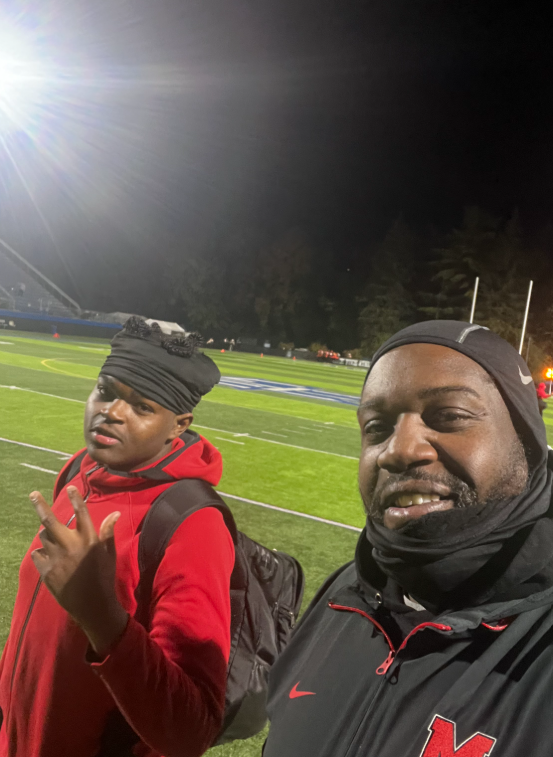Q&A With Kinnus Paul
Building OpportunityEconomic MobilityNov 25, 2024

In this edition of Q&A, we sit down for a long-awaited interview with Kinnus Paul, our Senior Program Manager for Economic Mobility who leads the Motor City Contractor Fund. Paul joined the team to head up this unique program, which provides access to capital, technical assistance and networking opportunities to Detroit-based contractors. A veteran of the construction industry, Paul has been instrumental in driving the Motor City Contractor Fund and thinking outside the box when it comes to how we can better support skilled trades. In this Q&A, Paul shares his excitement about what innovations in technology mean for workforce development, and how the second cohort of Motor City Contractor Fund participants will benefit from the newly expanded program. Paul also shares insight on how teams succeed – both on and off the field.

Q: How does your background inform your approach to economic mobility programs at the Gilbert Family Foundation – and in particular, the Motor City Contactor Fund?
A: I began my journey in philanthropy in 2008 as a job developer at a local nonprofit. One of my first projects was an environmental technician training program where trainees earned certifications like state Lead and Asbestos licenses, 40-hour HAZWOPER, basic construction skills, and Phase 1 and Phase 2 site assessment training. These credentials made our trainees highly marketable, especially with all the redevelopment happening in the city at the time.
But there was a significant challenge: there weren’t enough city-based companies to employ them. This gap created cultural disconnects in hiring within such a labor-intensive field. Unfortunately, diversity and inclusion was rarely prioritized in construction. When conflicts arose on job sites, companies often opted to fire employees rather than invest in conflict resolution or training. As a result, many of our trainees struggled to maintain long-term employment.
When I had the opportunity to create the Motor City Contractor Fund, I knew I wanted to address these long-standing challenges head-on. The lack of BIPOC contractors in Detroit has left a void in the construction ecosystem, making it harder for BIPOC tradespeople to feel represented and supported. Many of them feel like double minorities in a space where diversity is scarce.
My early experiences as a job developer opened my eyes to these issues and gave me the tools to work toward solutions. The Motor City Contractor Fund is my way of creating meaningful change—building a stronger, more inclusive skilled labor workforce that supports BIPOC workers and contractors alike.
Q: The Motor City Contractor Fund provides both capital and technical assistance. What made you decide on this dual approach, and how do these elements complement each other?
A: We knew that access to capital remained the most significant barrier to the growth and development of minority-owned businesses. That’s why we created a financial product specifically designed for the contractors we serve. With relaxed credit requirements and the ability to use projects as collateral, we’ve made funding more accessible to those who need it most.
But access to capital is only part of the equation. In most cases, technical assistance is the vehicle that gets contractors to their funding goals. Many businesses are denied funding not because of a lack of potential, but because they aren’t prepared for the underwriting process—they might lack proper bookkeeping or the necessary documentation funders require. Our technical assistance program removes the guesswork, guiding contractors step-by-step and essentially “teaching to the test.” By equipping contractors with the tools they need, we’re building their confidence and ensuring they’re ready to succeed. Beyond loan preparation, MCCF provides contractors with critical tools to grow and expand their businesses, including support in marketing, human resources, bookkeeping, and bidding correctly. We also connect them directly with job providers in Detroit, opening up more opportunities to secure projects in the city.
Q: The construction industry faces various challenges including supply chain issues and skilled labor shortages. How does the Motor City Contractor Fund help contractors navigate these obstacles?
A: The Motor City Contractor Fund helps tackle these challenges by connecting our participants to the resources they need to thrive. Networking events like “Show Me the Money” gives contractors invaluable face time with local lenders, helping them build essential banking relationships. At our “Contractor Connect” event, we flip the script on the traditional job bidding process—job providers present their projects directly to our contractors, who then have the chance to decide which projects to bid on.
Beyond these events, we offer opportunities for contractors to sit down with industry experts to strengthen their businesses. This kind of access removes the stress of navigating the construction world alone—whether it’s finding the right person to answer questions about a bid or connecting with a specific supplier.
Our goal is simple: to give our contractors a real edge in the construction ecosystem and set them up for lasting success
Q: What’s next for the Motor City Contractor Fund?
A: Our second cohort of the Motor City Contractor Fund (MCCF) kicked off in late September, bringing together 50 Detroit-based contractors—double the number from our first cohort! With nearly $5 million in loans closed during our first cohort, we’re setting our sights even higher, aiming to double that amount by the end of this new cohort.
We’re also excited to launch the “Ignite Track,” designed as a starting point for entry-level contractors. This program is perfect for those who may not yet have a full pipeline of projects, lack financial organization, or have never applied for business funding before. Think of MCCF as the drive phase in a race—the part where you dig deep and hit your stride. Ignite, on the other hand, is the starting block, helping contractors get off the ground and into the competition.
We’re thrilled about what’s ahead and can’t wait to see the impact these programs will have on Detroit’s contractor community!
Q: What innovations in workforce development program design/implementation have you seen that particularly excite you?
A: We’re in the midst of a creative renaissance in workforce development, with incredible opportunities for wage growth and career advancement all around us. Technological advancements across industries are transforming the way we work, opening doors we never thought possible.
Take modular housing, for example—through innovative techniques, we’re reducing costs and dramatically cutting the time it takes to transform an empty lot into a fully functioning home. Or look at 3D printing, which is now creating prefabricated walls for construction. In advanced manufacturing and healthcare, engineering controls are not only delivering high-quality products but also protecting the workforce. And tools like augmented and virtual reality are making job exploration safer and more accessible, even in industries like construction, where on-site visits might pose risks.
These innovations are just the beginning, and they have me energized about the possibilities. The goal is clear: to create more opportunities and Get Detroiters Paid!
Q: Could you share your thoughts on the intersection of workforce development and economic mobility? How do skills-based programs fit into the broader picture?
A: Workforce development and economic mobility are deeply connected because they both focus on creating opportunities for individuals to achieve financial stability and upward movement in their quality of life. When workforce development programs are thoughtfully designed, they become a key driver of economic mobility by enabling individuals to secure jobs that pay livable wages and offer pathways for advancement. In the broader picture, skills-based programs contribute to both individual and community economic mobility. For individuals, they create pathways to stable, well-paying jobs. For communities, they help address systemic workforce gaps and promote economic growth by building a pipeline of qualified workers.
By aligning workforce development initiatives with economic mobility goals, we can create systems that not only prepare people for jobs but also empower them to thrive long-term.

Q: Between your football days and your construction experience, you’ve seen a lot of teams in action. What makes a great team in your opinion?
A: The heart of any great team is commitment. A strong team isn’t just focused on achieving a common goal they’re also deeply committed to supporting one another. This kind of dedication builds trust, creates accountability, and helps grow leaders from within.
It’s simple: when a team comes together, gains true buy-in from everyone involved, and commits to a shared purpose, success naturally follows. Commitment turns ideas into action and makes even the biggest goals feel achievable.